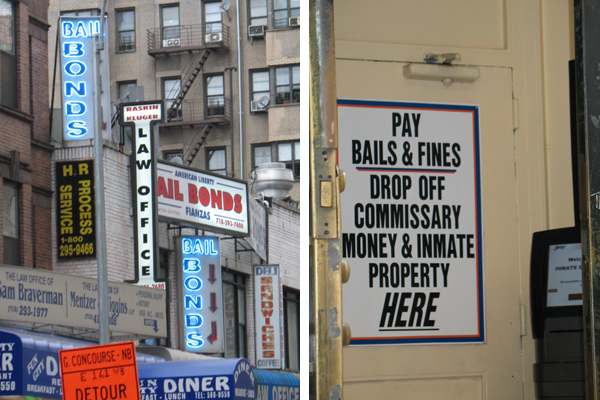
Photo by: Jarrett Murphy
In the fall of 2007, City Limits reported on the perverse impact of financial bail—which forces some low-income defendant to stay locked up awaiting trial, disrupting work and family life and enticing some to make false guilty pleas. Two years ago, a Human Rights Watch report came to much the same conclusion.
Now, it appears reform is on the way. In his annual state of the judiciary speech on Tuesday, New York Chief Administrative Judge Jonathan Lippman called for broad reforms of the bail system in New York state.
Most defendants are released pending trial. Many are let out on their own recognizance—basically, the court trusts them to return for trial. But if the court determines there is a risk a person will skip court, the judge essentially forces that defendant to put down a deposit if he or she wants to go free pending trial. If the person shows up for court, they get the money back. If they skip, they lose it.
In New York City, many cases end at arraignment with a simple sentence or dismissal. But more than half—about 180,000 in 2011—continue beyond that first appearance. In about 30 percent of those cases, bail is set. Even in misdemeanor cases, bail is set about 20 percent of the time.
But according to the 2011 annual report of the New York City Criminal Justice Agency, the nonprofit contractor that evaluates all criminal defendants in the city and recommends release terms to judges, only 12 percent of defendants who had bail set made that bail.
Even for bails of $500 or less, only 19 percent made it. That’s because for poor people, $500 is still a lot of money, and for bail bondsman—who earn a fee by bailing out defendants who can’t come up with the cash—those low bails don’t generate enough revenue to make them worth doing.
As a result, many people sit in jail awaiting the next steps in their case. Some are eventually released, some aren’t. But in the case of misdemeanor defendants—the majority of the system—the very minor nature of their crime introduces a perverse choice: If they admit guilt, they are often release sooner than if they maintain innocents and await their day in court. So, some defendants plead out, even if they believe they are innocent. Later on, these guilty pleas can come back to haunt people applying for a job, housing or dealing with an immigration issue.
As Lippman put it, “More than simply being unfair, incarcerating indigent defendants for no other reason than that they cannot meet even a minimum bail amount strips our justice system of its credibility and distorts its operation. Jailing defendants before trial can subject them to economic and psychological hardship, limit their ability to assist in their defense and place them at a serious disadvantage in the plea bargaining process.”
He added: “To avoid these results, our bail statutes must be reformed to make clear that, where defendants are charged with non-violent offenses, there is a statutory presumption that they will be released with the least restrictive conditions possible unless prosecutors demonstrate that the defendant poses a threat to public safety or a legitimate risk of failure to appear in court. “
Lippman also called for allowing judges to consider public safety in determining whether to grant bail—New York is one of a handful of states where safety is not a consideration—and announced a new program to provide some misdemeanor defendants with pre-trial supervision, a way to ensure people show up for trial without imposing bail. He also called for more efforts to take the profit motive out of the bail business, pointing to nonprofit bail funds that have popped up in the city.







